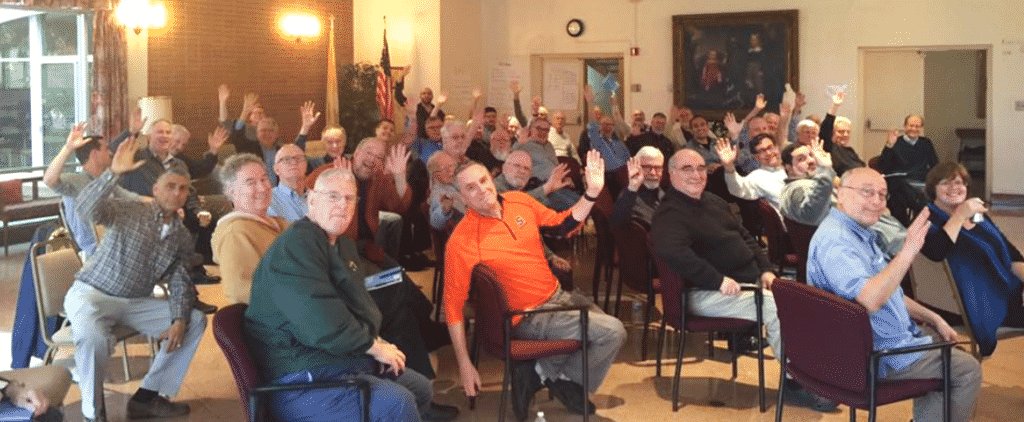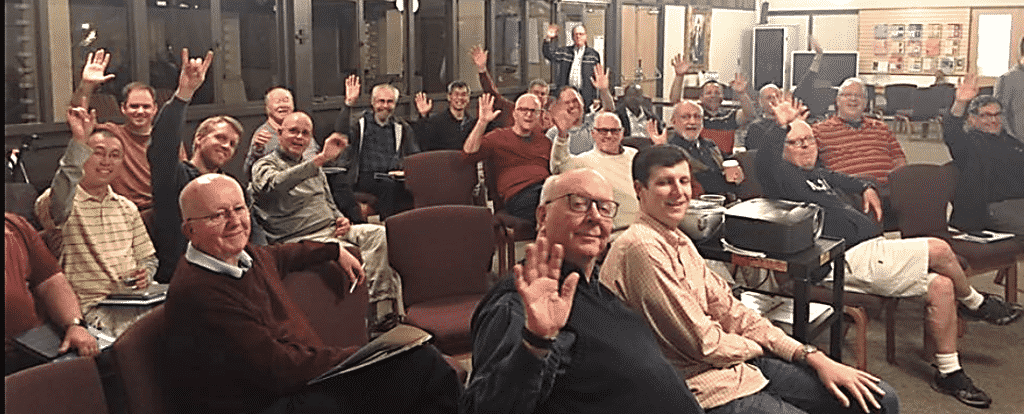December 4, 2017
A Monthly Newsletter for Paulist Associates
The Associates World is the newsletter of the Paulist Associates. You can download a copy of this newsletter in PDF format (excellent for printing), or scroll down to read it in your Web browser.
- Interview with Fr. Steve Petroff, CSP
- Grand Rapids Reflects on Isaac Hecker
- Save the Date
- Rest in Peace
- Notes from the Paulist Regional Pre-Assembly Meetings
- A Chapel in Rome Where Hecker Prayed
- Proposed Program for January
- Prayer for the Intercession of Father Isaac T. Hecker
- Contacts
- Promise
by Levita Anderson, Associate from Chicago
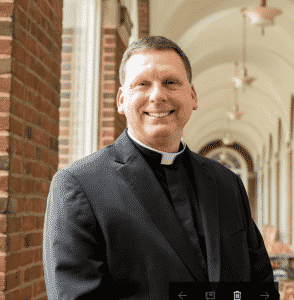
Father Steven Petroff was ordained on May 20, 2017 at St. Paul the Apostle church in New York City. He was assigned to Old St. Mary’s Church this summer. Here are his comments based on the following questions that were asked during our interview.
What has life been like for you as an associate priest of Old St. Mary’s Church?
Since my arrival at Old St. Mary’s I have been on a learning journey. This journey included learning the “lay of the land”, my pastoral duties, RCIA, the young adult ministry, just to name a few of my responsibilities. These last few months have been full and exciting. The staff has been great showing me the ropes, and the parishioners have welcomed me with open arms.
I was privileged to preach and celebrate Mass with the special concert by the Paulist Choristers, the boys’ choir that used to sing at Old St. Mary’s until 1967, and I had two baptisms that evening too.
What are some obstacles you are trying to overcome as associate priest?
The obstacles I had to overcome were scheduling my time to get paperwork completed, and developing a syllabus for RICA; while not forgetting to go out and meet with people is always important to me. Another obstacle I’m trying to overcome is to not over think things. This is fairly new to me and applying what I learned in seminary classes and as a deacon, and then putting them into action is slowly becoming easier. Learning to cook is one of my ongoing goals since we didn’t have to cook in seminary residence.
What experiences are you bringing to the parish that will help us to continue to go as intentional disciples?
I hope the experiences that I am bringing can help me offer a fresh new perspective to things. In my mind, sensing opportunities that may or may not work, keeping the synergy between the school and church. Our country is changing and being able to understand and respect our neighbors with prayer and intention is very important right now. I also want to give the priests here a break to be able to unwind spiritually and physically.
Describe your pastoral duties in the parish.
Most exciting for me has been working with the young adults’ ministry and the RCIA inquirers. The RCIA inquirers meetings are so enjoyable. Getting to know them, prodding them to talk, and plugging into their journey is a learning experience for them and me. The young adults have had good meetings so far. It is inspiring to see young, busy people with busy lives have a hunger for their faith and desire to spread that hunger. I have a sincere desire to grow the young adult ministry and be responsive to them with my ears and eyes wide open, as well as to learn from them. However, I want to meet their needs and make sure they don’t get run over. I want to help feed their spiritual journey, and then give them room to grow their ministry.
Do you have any final comments as we conclude this interview?
In conclusion, I want to make Isaac Hecker proud and learn from the people and priests of Old St. Mary’s. I’m pretty content with what I have been doing so far. It’s not perfect yet, but I’m learning that this parish has their arms open to catch me if I fall and the encouragement to keep me going. My favorite quote is from a former spiritual director who used to remind me, “Be good to the people of God, they will teach you how to be a good priest.” This will be my journey, to follow Isaac Hecker and be a good priest.
Reflection by Cathy Hoekstra — Paulist Associate in Grand Rapids – published 02/19/2017
It is a law of Divine Providence … that He gives His grace to fulfill the duties of the station to which He calls us.
According to his diary entries, Father Isaac Hecker agonized over the decision as to which priestly order he should enter. He sought counsel from his confessor who would not give him the answer, but advised him to continue thinking about it. Father Hecker wrote how all through his life God’s grace has been with him and God has provided answers for him in due season. In the meantime, he continually rededicates himself to God and is open to God’s leading. The above quote is very comforting, but also disturbing. We know and believe that God’s grace, Divine Providence, is always available to us no matter what or where we are in life. But we have to be open to the Holy Spirit, to discern what God calls us to in this life, and to be faithful to that calling for His grace to be operational in us. As a Paulist Associate, I find that the writings of Father Hecker encourage me to live the life I am called to.
Paulist Associates Regional Retreat for 2018 — Chicago
July 13-15, 2018
Details will be made available after the first of the year.
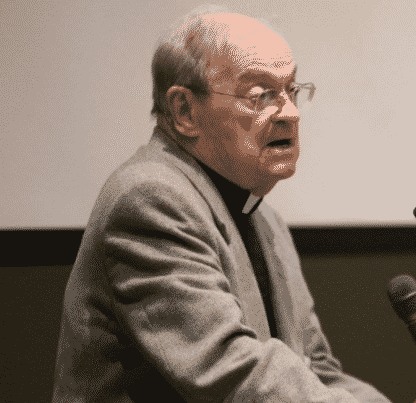
by Fr. Frank Desiderio, CSP, Paulist Associates National Director
Nearly 80 Paulists gathered in two locations to discern the direction of Paulist ministry over the next four years. Thirty-one Paulists met in Los Angeles at the Mary and Joseph Retreat Center and forty-eight met in Washington, D.C. at the Washington Retreat House.
These two regional meetings were a way for the Paulists to prepare for the next General Assembly of the Paulist Fathers in May of 2018.
The Paulists who gathered at the pre-assembly meetings prayed together and reflected on the signs of the times. There was a very intentional discernment process led by Dr. Kathy Galleher to help the Paulists determine the focus of our energies in service both the Catholic Church and the American culture.
The meetings were structured the same. Over three days each gathering heard an address by President Eric Andrews on the state of the community and then heard from a Signs of the Times panel. The panel consisted of one Paulist who offered an overview “from 30,000 feet” and then two Paulists who did the “street level view” of current trends; one Paulist from parish ministry and one from campus ministry. The talks served as a catalyst for the small and large group discussions that followed.
The process followed the questions: Where have we come from? Where are we now? Where are we called? What do we want the assembly to focus on? The process put together by a committee and Dr. Galleher fostered an atmosphere of listening, sharing and discerning the call of the Holy Spirit to the Paulists. Most sessions had quiet time, reflection questions, then small and large group sharing followed by a summary.
On both coasts there was a general agreement on the signs of the times and how the Paulists were being called. Both gatherings remarked on the divisive climate in our church and culture, both remarked on how the Paulists can help be bridge-builders in our polarized church and culture. The Paulists saw themselves as doing a ministry of listening, compassion and helping people heal divisions. We saw this as part of our ministry of reconciliation. On both the east and west coast Paulists recognized that with more men moving into senior ministry we may need another house where seniors can live together and do meaningful pastoral ministry.
The West Coast gathering called for a process to plan long-term for our personnel allocation. The East Coast gathering surfaced the idea of the Paulists being primary promulgators of “The Joy of the Gospel.” Both coasts indicated a desire that the Paulists use innovations in social media to spread the gospel message. There was a stark awareness of the growing number of young people who say they are agnostic or atheist.
Next January the Paulists begin their election process, which will bring in the next administration. That administration will be guided by the mandates and resolutions of the Paulists General Assembly, which meets the week after the ordination to the priesthood of deacons Ryan Casey and Michael Hennessy on Saturday, May 19, 2018.
by Fr. Frank Desiderio, CSP, Paulist Associates National Director
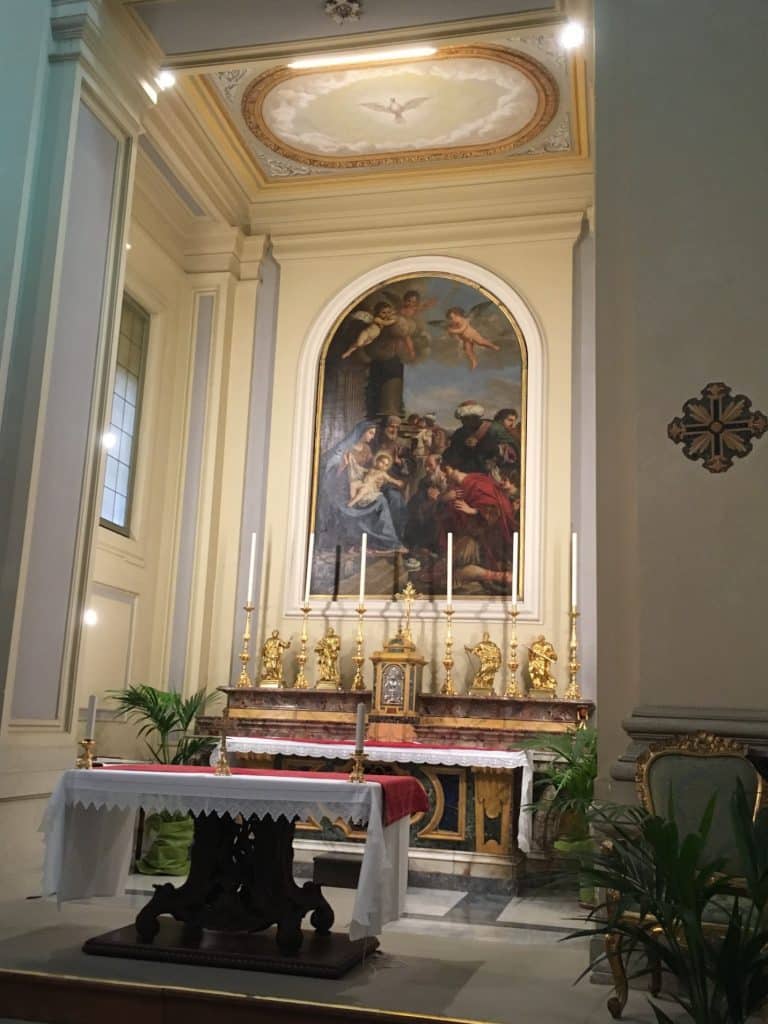
The Congregation, now called the Congregation for the Evangelization of Peoples is housed in the Palazzo Ferratini, at the south end of the Piazza di Spagna. At the north end are the famed Spanish Steps. Not far from here, Fr. Hecker took lodgings during his stay in Rome.
In his first visit to the Cardinal, feeling trepidation and unsure of his future, Fr. Hecker went to the chapel on the ground floor of the Congregation to pray and ask God’s guidance. The chapel is called the Chapel of the Magi. The Magi, the first foreigners who recognized Christ as the Messiah, represent all people to whom missionaries are sent. Behind the altar in the chapel is a painting of the Adoration of the Magi pictured here. Also in the chapel is a painting of the Conversion of St. Paul.
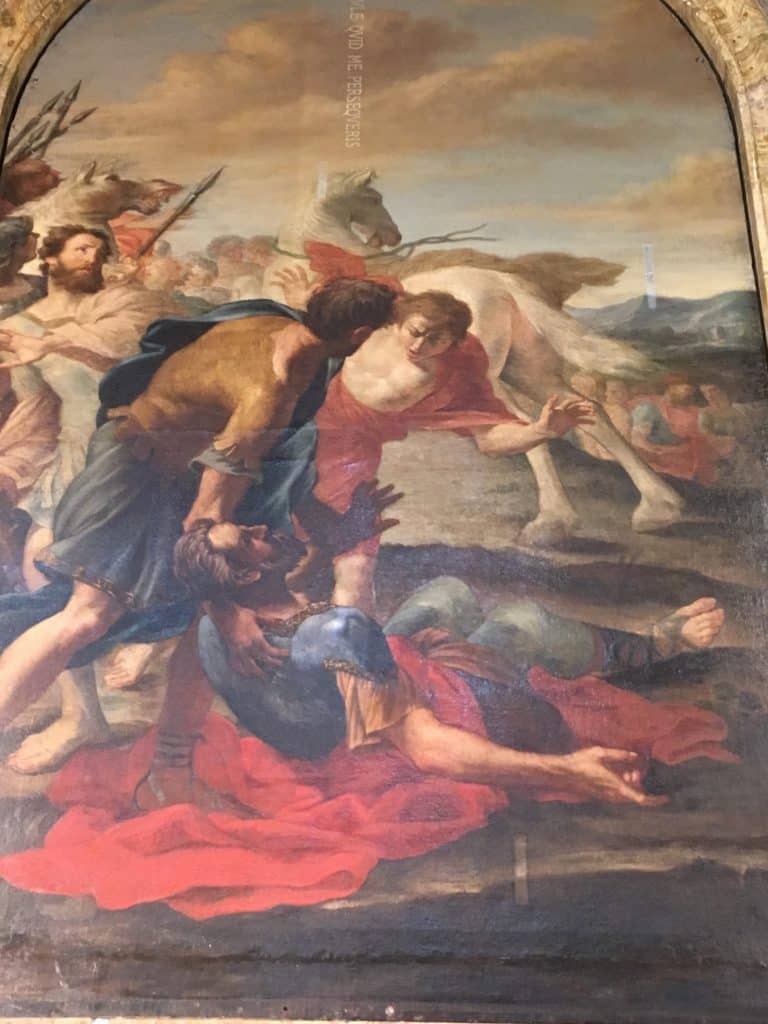
Fr. Steve read from the The Paulist Vocation and other material he gathered about Fr. Hecker’s time in Rome. We spent quiet time in prayer and then reflected on Fr. Hecker and this critical juncture in the Paulist Father’s history. This was a most meaningful pilgrimage, a surprise gift Fr. Steve and Rosanna arranged for me.
After Fr. Hecker prayed in the chapel he went up and met Cardinal Barnabo for the first time. He presented his letters of recommendation from the leading lights of the American church. Fr. Hecker laid out his case. From that moment forward. Cardinal Barnabo was Fr. Hecker’s best ally. This well-connected Cardinal had an open-door policy where Fr. Hecker was concerned. Cardinal Barnabo counseled Fr. Hecker and guided him through bureaucratic labyrinth of the Vatican. Cardinal Barnabo arranged the meeting between Fr. Hecker and Pope Pius the IX, which resulted in the creation of the Paulist Fathers.
(This is a suggested format; each group may select another outline or topic.)
Fr. Frank DeSiano, CSP, the President of Paulist Evangelization Ministries (PEM), recently wrote a thoughtful and thought-invoking piece entitled “The Conversion of America.” The Paulist Associates Board believes that this is an impressive contribution to the dialogue around the Paulist mission for the 21st century.
This is the third installment, which includes a section of that article along with some questions that Fr. Frank has prepared for us.
Theme: The Conversion of America – Part 3 by Fr. Frank DeSiano, CSP
Opening Prayer: The Paulist Prayer Book, select the day on which you meet
Reading (in advance of the meeting)
To become “one people,” as is inscribed in the American set of ideals, involves a review of basic attitudes that we have toward each other, as well as the ultimate image we have of the American experiment. To understand ourselves as profoundly connected to each other, and to become sensitized to the ways we demonize each other, often in the name of economics, implies yet other conversions needed in the American mind.
The Third Conversion

Were it true that excessive wealth generates wealth for others, those lower on the famous totem pole, we would see evidence of this. In fact, we do not. Surely industries emerge and bring jobs, just as industries atrophy and give up jobs. In some way creating industry and business is a way to distribute wealth. But the massive extrapolation of pay to company executives in the past twenty years has certainly not produced a massive extrapolation of jobs. Recovering from the collapse of the mid-2000s took years, even though there were regular news reports of just how much capital big industry and business had on hand during those years of massive economic shrinkage. They had the money, but they were not disposed to spend it. And they certainly were not spending it to create jobs.
This conversion entails a major revision of the American myth of endless expansion, wealth, and power. The myth itself arises, paradoxically, from the endless fear Americans have of never having enough wealth and power; that is, a feeling of inferiority and insecurity that drives the need for expansion without limit. It’s as if America, as the new person on the block, had to prove to England and France that it could be an equal. American expansionism was inward until after World War I; then America realized it could have influence overseas as well. Expansion by way of territories shifted, after World War II, into expansion by way of business and natural resources.
Yet beyond a certain base—and that base might be different for different segments of society—how much is needed to live? Or even to thrive? The problem is not one of mere envy (as is often argued, even with a straight face) of the poor for the wealthy. Rather, the exaltation of possessions without limit adds a distinctive distortion to societal thinking itself. Beyond the relentless pushing that such attitudes imply, a relentlessness that permeates the whole workforce, it insidiously posits an idol for everyone to worship. Our lists of millionaires has morphed into our lists of billionaires. What, you haven’t made your million yet? What’s wrong with you?
If possession itself were ideal, would not all the very wealthy be exuding boundless joy? While some certainly have found happiness, the image of wealthy people pursuing even more wealth, almost as a disease, is not without validity. Surely some billionaires think of philanthropy, allocating some portion of their vast wealth to help others. But many billionaires and millionaires spend most of their time thinking of how to keep what they have, pay as little tax as necessary, and acquire even more. That these people seem to be part of a special class of citizens only splits American society further.
Ultimately, whoever we are and whatever our resources, the limitations of the earth’s resources, and the limitations on just how much we can pander to ourselves, should lead everyone to live with moderation and limitation.
The Fourth Conversion
Recognizing the limitations of the earth’s resources means recognizing that we are all connected by our common emergence out of nature. We all belong to the earth and, therefore, in some way we all belong to each other. To ask Americans to give up the myth that “it’s all here for the taking,” is to ask American to realize yet another needed conversion.
A deeper, fourth, conversion is still necessary: each American to treat each other American the way they would like their own family to be treated. The value behind this conversion underlies the conversions we have already noted: that there is a “one” that we all contribute toward; that we renounce regionalism and parochialism; and that we realize unlimited expansion is ultimately destructive.
Modern media has accomplished something quite paradoxical. On the one hand, it can bring every person into the immediate experience of virtually any other person. Their cancers, their scandals, their career gaffs—we love to watch the drama of the lives of others and are, at times, even moved to act. When Boko Haran kidnaps over 200 girls in Nigeria, the rage is international. When a worker loses a finger in a work-related accident, we are all up in arms against the employer. On the other hand, such immediacy can cause a distancing, and even an immobility. We grow fatigued with our compassion and, as a result, we just shut ourselves down.
Nevertheless, there is no reason why the basic claims of another person are, in some way, different than the basic claims that any one of us would make. What basic claims? Protection from invaders, of course, and equal treatment under law. But, particularly, to the minimum needed for shelter, food, education, and health. These pertain the dignity of every human being; society should design itself to address just these issues. Of course, employment provides a way for people to have money to satisfy these needs. But employment doesn’t always work … as when depressions emerge in an economy, or employers treat employees as pawns to be used, as when people fell gravely ill and cannot work, as when mental issues prevent someone from functioning.
America has long tried to differentiate the “poor” from the “deserving poor,” using some implicit Calvinist calculation that if people are good, God cares for them, showing they are justified. If people, however, seem uncared for, that must mean they are not justified before God. While we can readily recognize this way of looking at God as almost demonic, that image still holds sway in the layers of America’s subconscious. As a result, my uncle may deserve help when he loses his job, or when he is arrested, or when he falls ill. But when someone else’s uncle suffers the same thing, I want to wrinkle my nose and claim that this must be his own problem.
The rural past of most cultures, where people could somehow thrive with readily available food and a half-forgiving relative, has now morphed into urban mode. The assumed connectedness of countryside has shifted into the presumed unconnectedness of urban life. While these stereotypes surely contain a lot of distortion, nevertheless they affect the instinctual way we think and act. If this attitude lead us, however, to deny the humanity of any individual in society—at least in terms of basic claims—then it is distorting our human reality. When whole sectors of society live in poverty, without nutrition, education, shelter, or health, this inevitably diminishes the humanity of us all. When most of society has these basics, then the functioning of society—including its economy—furthers everyone’s interests, the rich and the poor.
Something like this might seem like “socialism” or “communism,” as these have become the straw men to attack in contemporary discourse. Perhaps, though, the idea is more like “solidarity,” something able to be quite in tune with modern capitalist and free market systems, so long as those markets are not seen as ends in themselves. The word “economy” by itself implies a connectedness of all the people who exchange value as a way to improve lives. An “economy” where each strives for him- or herself actually bucks against the much sounder idea of a field in which the economic activity any one in some way influences the economic reality of everyone.
Conversation Catalyst
- What do you think might dispose people to accept greater limitations in their usage of resources or their attitude toward money?
- In what ways do you think people see themselves bonded with others? What events or incidents have you witnessed that show this?
- How do you think most Americans would take to the idea that the good of one affects the good of all, or the misfortune of one augments the misfortune of all?
News/Announcements
Closing Prayer
Prayer for Generosity — St. Ignatius of Loyola
A Christian Prayer in Union with Creation — from Pope Francis’ encyclical, Laudato Si
Father, we praise you with all your creatures. They came forth from your all-powerful hand; they are yours, filled with your presence and your tender love. Praise be to you! Son of God, Jesus, through you all things were made. You were formed in the womb of Mary our Mother, you became part of this earth, and you gazed upon this world with human eyes.
Today you are alive in every creature in your risen glory. Praise be to you! Holy Spirit, by your light you guide this world towards the Father’s love and go with creation as it groans in travail. You also dwell in our hearts and you inspire us to do what is good. Praise be to you! Triune Lord, wondrous community of infinite love, teach us to contemplate you in the beauty of the universe, for all things speak of you. Awaken our praise and thankfulness for every being that you have made. Give us the grace to feel profoundly joined to everything that is. God of love, show us our place in this world as channels of your love for all the creatures of this earth, for not one of them is forgotten in your sight.
Enlighten those who possess power and money that they may avoid the sin of indifference, that they may love the common good, advance the weak, and care for this world in which we live. The poor and the earth are crying out. O Lord, seize us with your power and light, help us to protect all life, to prepare for a better future, for the coming of your Kingdom of justice, peace, love, and beauty.
Praise be to you! Amen
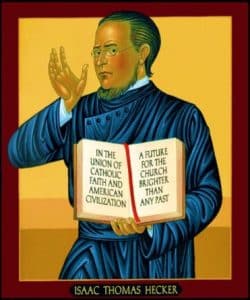
Look upon us this day, with compassion and hope. Hear our prayer. We ask that through the intercession of Father Hecker your servant, you might grant us (state the request).
We ask this in the name of Jesus Christ, Your Son, Our Lord, who lives and reigns with You and the Holy Spirit. One God, forever and ever. Amen.
When you pray this prayer, and if you believe that you have received any favors through Hecker’s intercession, please contact the Office of the Cause for Canonization of Servant of God, Isaac Hecker at [email protected]. Visit the web site: isaachecker.org to learn more about his life and the cause for his canonization.
Paulist Associates National Director
Frank Desiderio, CSP
Paulist General Office
New York, NY 10023
Board Members
Angie Barbieri
Toronto, ON, Canada
Paula Cuozzo
Boston, MA
Cathy Hoekstra
Grand Rapids, MI
Mike Kallock, CSP
Katherine Murphy Mertzlufft
Columbus, OH
Joe Scott, CSP
I believe that I am drawn by the Holy Spirit to the spirituality and qualities of the Paulist Community. I have discerned both by prayer and study that God calls me to become associated with the Paulists. I promise that I will pray for the works of the Paulist Society, meet with others, who are also members of the Paulist Associates, for spiritual sharing and formation; and I seek to embody the apostolic qualities of the Paulists in my daily life.
Attentive to the Holy Spirit and faithful to the example of St. Paul and the charism of Father Isaac Hecker, I commit myself for one year of membership in the Paulist Associates.
